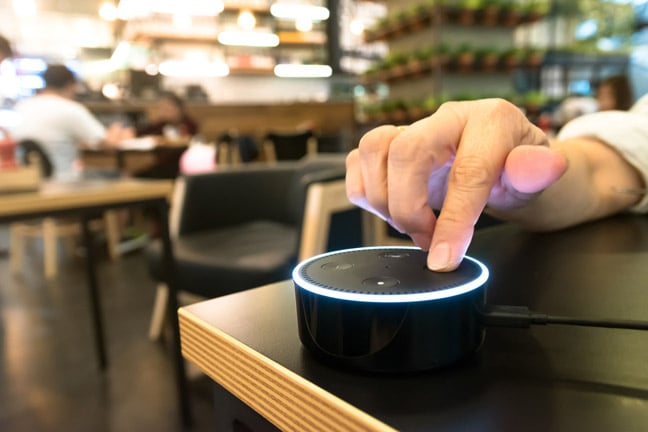Opinion Consequences can come at you fast or slow. If you’re a trillion-dollar company, you get to choose which, a bit, but you can never escape completely.
Amazon is burning billions on Alexa because voice assistants need massive infrastructure but can’t be monetized. Google Cloud is $700 million in the red as of last earnings and heading south to a state of madness like a New Jersey retiree. These are mature products in saturated markets. You don’t need an MBA to know what will happen. But even the dean of Harvard Business School can’t say when.
The big confounding factor is reputation. Take Alexa, which, as has been noted, is overwhelmingly used for a few simple tasks: playing music, setting timers, doing quick queries, switching lights. Shopping and advertising? Not so much. The issue for Amazon over those few popular use cases is that they are very popular. For some demographics among the elderly and disabled they’re now part of their daily life. Millions more are habituated, with Alexa just being quietly useful when hands are full or pulling up a calculator app is just too much hassle.
Amazon’s model was to sell the hardware at or below cost and make the revenue from content and services. It’s a perfectly good model, if those services and content are as engaging as video games, or user data can be folded into ad targeting. None of this is true for Alexa, and it never will be. But if Amazon cuts and runs, hundreds of millions of users have had an intimate part of their life ripped out. One, furthermore, they considered paid for when they bought the gadget in the first place. How badly does Amazon want not to do that? It costs billions. It can’t keep paying. But it can’t just let it go.
Google is in an even worse position, not from the amount of red ink currently bleeding from its Cloud division, but because of its room to manoeuver is far less. There are around 4 billion email accounts in the world, and around 1.8 billion of those are Gmail. When you run a service for that many users, they run you.
Forget smart speakers, the ultimate digital assistant is email. You can’t get more intimately entwined with a user’s digital life than that. As well as business and personal correspondence, email is the primary management interface for identity on other services, the major personal archive, the butler of daily life. Losing access to your primary email account is beyond traumatic. Google is notably brutal in pulling the plug on popular services it considers no longer interesting, but surely Gmail would be impossible to shrug off. And it must be profitable, with all those users. Right?
It is very far from clear that it is. Google isn’t saying. Gmail, like G Suite-cum-Workspace and the whole bouquet of user and business-facing appified services, is reported as part of Google Cloud, which is losing a lot of money now and perhaps a lot more next year. There are subscription models and a little advertising which will be making some money. Clearly not enough.
An easier way to judge Gmail’s hue in the revenue spreadsheet is to ask yourself as a personal Gmail user, how much you’re being monetized. The old adage that if you don’t pay, you’re the product, cut both ways. Products cost, especially if you’re buying billions.
Advertising within Gmail is very low key and easy to avoid altogether, and Google is very clear that it doesn’t monetize your email content: “We do not scan or read your Gmail messages to show you ads.“ Google has played fast and loose about how it uses data, but if it cheated here it would be beyond catastrophic.
If Google isn’t making any money from you on Gmail, and there are billions like you, the numbers can explode in no time. Even if the company’s only losing a cent a day per free user, that’s $3.5bn a year for a billion users. It could be a lot more – Workspace business subscriptions start at 20 cents/day, and doesn’t offer much more than free. Disentangling what each component costs is impossible from outside, probably even within Google, but there’s a tightrope here and a fall could be very hard indeed.
Google couldn’t kill Gmail, but Gmail could kill Google. You haven’t failed until you fail at scale.
Are there no off-ramps? Big losses can be attractive sink-holes for fiscal engineering – you think Musk’s Twitter investors expect an operating profit? – and one traditional way out of a corner while saving face is to hive off the haemorrhage. Amazon could flog Alexa off to a third party for lots of someone else’s money, in the way many untenable tech acquisitions are used as debt management vehicles. When the system does die or degrade, Amazon will be far from the wreckage. That’s nearly impossible for Google, the regulatory ramifications and user pushback from selling 1.8 billion active email accounts would be measured in megatons.
Will Gmail fail? Google is still immensely wealthy, and can put off hard decisions for a while. Next year is going to be very hard, quarter by quarter, and the conversation may look very different in 2024. But while Amazon can and almost certainly will find a way out of Alexa, Gmail matters incomparably more to incomparably more people.
There may be no good exit strategy for Google, and so the question becomes – is there one for you? ®
Source link



